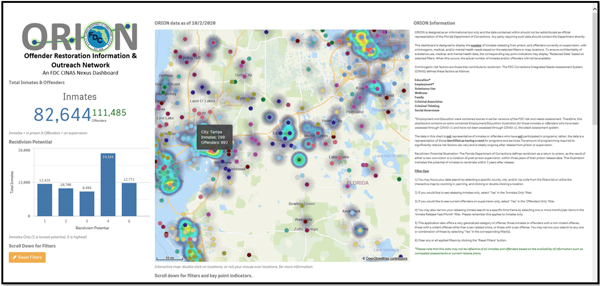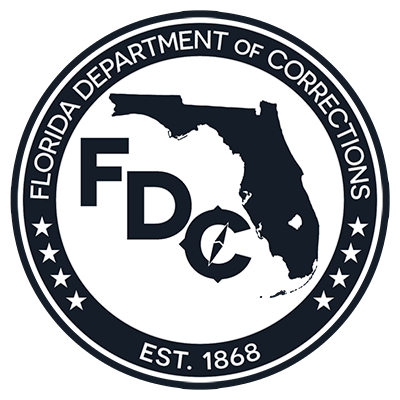Bureau of Program Development
CINAS and CINAS Lite
The BPD is responsible for the development and implementation of the Corrections Integrated Needs Assessment System, also known as CINAS. CINAS connects institutions and community corrections, providing needs data to community stakeholders through ORION, creating a true end–to–end continuum of care. CINAS addresses criminogenic needs effecting continued criminality, core programming needs such as GED/HSD, Career and Technical Education and Substance Use Treatment, transition to community needs, and provides case management services to track those needs and program placement through incarceration and/or community supervision.
In addition, the BPD developed a mobile version of CINAS called CINAS Lite. CINAS Lite can be used by other Florida justice agencies such as county detention facilities, re-entry portals, and any other Florida organization responsible for rehabilitation and restoration of justice-involved individuals. CINAS Lite and associated training can be provided by the BPD.
Read the press release about the CINAS Lite partnership between the FDC and Leon County Sheriff's Office!
For more information please send an email to [email protected]
Criminogenic Domains
A criminogenic factor refers to behavior, personal attitudes and beliefs, and various types of social and familial influences directly associated with criminality. Research has shown these dynamic factors can be addressed through evidence-driven programs and services designed to reduce or minimize these risk factors. In doing so, the Department works with the justice-involved individual to rehabilitate and restore her or him to a life of value, not more crime. CINAS and CINAS Lite assesses these criminogenic factors in eight domains. These domain are as follows:
- Education focuses on encouraging academic program achievement, minimizing learning barriers, and issues preventing appropriate participation in education.
- Employment focuses on encouraging career and technical education achievement and participation in programs that assist individuals in job searching, preparing and applying for a job, and keeping a job.
- Substance Use Prevention focuses on services that are designed to combat the maladaptive, antisocial pattern of substance use through education and or prevention techniques that provide individuals with the tools to recognize this behavior and to abstain and/or control it.
- Wellness focuses on encouraging participation in prosocial activities or pastimes with positive, holistic value during “free” or “non-structured” time. This dimension of prosocial behavior also promotes wellness and healthy community living.
- Family focuses on reducing familial conflict and strengthening these relationships (e.g., marriage, parent-child, domestic partnerships) by assisting with activities that develop healthy support systems (e.g., encouraging letter writing, encouraging positive behavior to merit visitation privileges), teaching parenting skills, and emphasizing responsibility for dependent children.
- Criminal Associates focuses on promoting self-management and decreasing association with friends or acquaintances who practice antisocial behavior, and by highlighting the individual’s role in peer association, the effects and consequences, and encouraging prosocial alternatives.
- Criminal Thinking focuses on challenging the reasoning and/or perceptions that lead to the violation of the accepted norms/conventions of society by providing individuals the opportunity to examine and identify thinking errors and triggers of criminal thinking, as well as to practice expanded thinking, empathy, and prosocial cognition.
- Social Awareness focuses on changing the pattern of manipulation, exploitation, and propensity for violating the rights of others by educating the individuals about the impact of risky and antisocial behavior, and teaching and promoting prosocial interaction, anger management, problem solving, and coping skills.
The following is an informational video regarding the Florida Department of Correction’s risk and needs assessment system.
ORION
ORION, a public domain data visualization tool, is an extension of the CINAS system. This dashboard allows stakeholders such as the Legislative members and staff, other criminal justice agencies, and community providers to see the number of offenders currently residing in, and inmates releasing to, their communities. This dashboard will display numbers in each criminogenic domain, potential medical and mental health needs, as well as the number of inmates expected to be homeless upon release. Users will be able to filter results by a variety of methods such as county, city, zip code, inmates only, offenders only, release date (inmates), and a general category of offenses including non-violent, violent, and sex offenses through filters and an interactive Florida map.
Click Here to view.

Program Clearinghouse

The FDC strives to deliver quality programs that are proven to treat criminogenic risk factors that influence continued criminality. The BPD is responsible for evaluating the effectiveness of offered programs and services. Through a detailed review utilizing evidence–driven research, the BPD categorizes programs as either evidence–driven, an elective, or a service that provides prosocial skills. The Program Clearinghouse is a vital part of the CINAS Continuum as it connects appropriate programs and services to the CINAS Case Management Plan to provide a roadmap of such programs and services for inmates. The Program Clearinghouse facilitates effective case management services.
If you are interested in establishing a program for inmates, please complete the form found at the link below. Submission instructions are included.
Program Review Application
- Bureau of Program Development
- CINAS and CINAS Lite
- Criminogenic Domains
- ORION
- ORION ES
- Program Clearinghouse
- Program Review Application
- Bureau of Education
- Academic Education
- Career & Technical Education
- Community Transition Services
- Canine Obedience Training
- Higher Education in Prison (HEP)
- Library Services
- Bureau of Substance Use Treatment
- Substance Use
- Community Based Programs
- Community Based Re-Entry Programs
- Re-Entry Centers
- Volunteer Services
- Resource Directory
- Re-Entry Programs Registration Application
- Bureau of Chaplaincy Services
- Worship/Religious Education Programs and Services
- Religious Diet Program
- Faith and Character Based Programs

